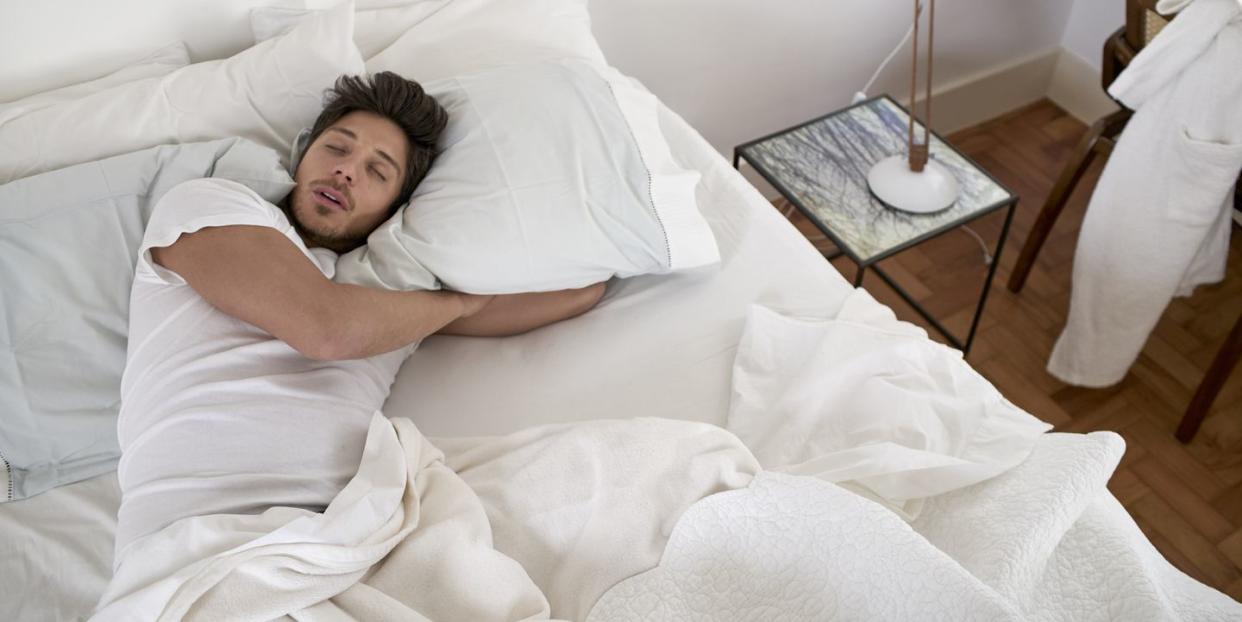A Sleep Doctor Shared Exactly How He Treats His Sleep Apnea

A night in a sleep lab during a fellowship at Stanford University explained what Gerard J. Meskill, M.D., 39, had felt for years: morning grogginess and afternoon brain fog. The neurologist, a sleep specialist, and the CEO of Tricoastal Narcolepsy and Sleep Disorders Center in Houston discovered that, like one in four men, he had sleep apnea. That’s when the tongue and throat muscles relax and may make it more difficult to breathe, which can potentially disrupt sleep. Sleep apnea can also increase the risk of heart disease, dementia, mood disorders, erectile dysfunction, and sleeping in the guest room. Here’s how he manages it.
Close the bar early
A few beers before bed may make it easier to fall asleep, but alcohol is also a central nervous system depressant. As a result, it can reduce your respiratory drive and increase relaxation, which can lead to more snoring and sleep apnea. I’m not perfect, but I usually avoid drinking within two to three hours of going to bed.
Crank some cardio
I cycle on a recumbent bike at home three to five days a week for at least 30 minutes—I have no interest in sweating to death in the Texas heat. A person with better cardiovascular fitness is going to have better respiratory muscle tone—which usually means less loose tissue to block off the back of the throat. Consistent exercise is more important than rigorous exercise, so pick a workout that’s easy to stick to.
Commit to a CPAP
I wear a ResMed AirSense 10 CPAP (continuous positive airway pressure) machine every night. People joke that it’s an effective form of birth control. Not true. Just put it on after sex. Once I found the right fit, I slept much better and now feel awake during the day. It’s still a hard sell, however. Nobody wakes up one day and screams, “My God, I have to wear underwear every day for the rest of my life?” But that’s what they think about a CPAP. I tell them to give it time. Four out of every five patients I’ve prescribed one to have stayed on it.
Sleep “naked”
The last thing I take off before getting into bed is my smartwatch. I don’t like the sensation of something on my wrist when I’m sleeping, and the sleep data you get from them isn’t that accurate. More important than assessing my sleep now is getting it. I head to bed at around 11:00 p.m. and wake up around 6:00 a.m. every day.
Other ways to help sleep apnea
First, try sleeping on your side! If that doesn’t help and you’re reluctant to use a CPAP—I was at first—you might try a mouthpiece that opens up your airway by shifting your jaw and tongue forward. It works for a lot of people with mild to moderate sleep apnea but wasn’t as comfortable for me as a CPAP. Some of my patients are candidates for surgery to trim the tissue in the back of the throat. Newer procedures, like implants that stimulate airway muscles to keep them from relaxing, are also worth talking to your doctor about.
You Might Also Like

